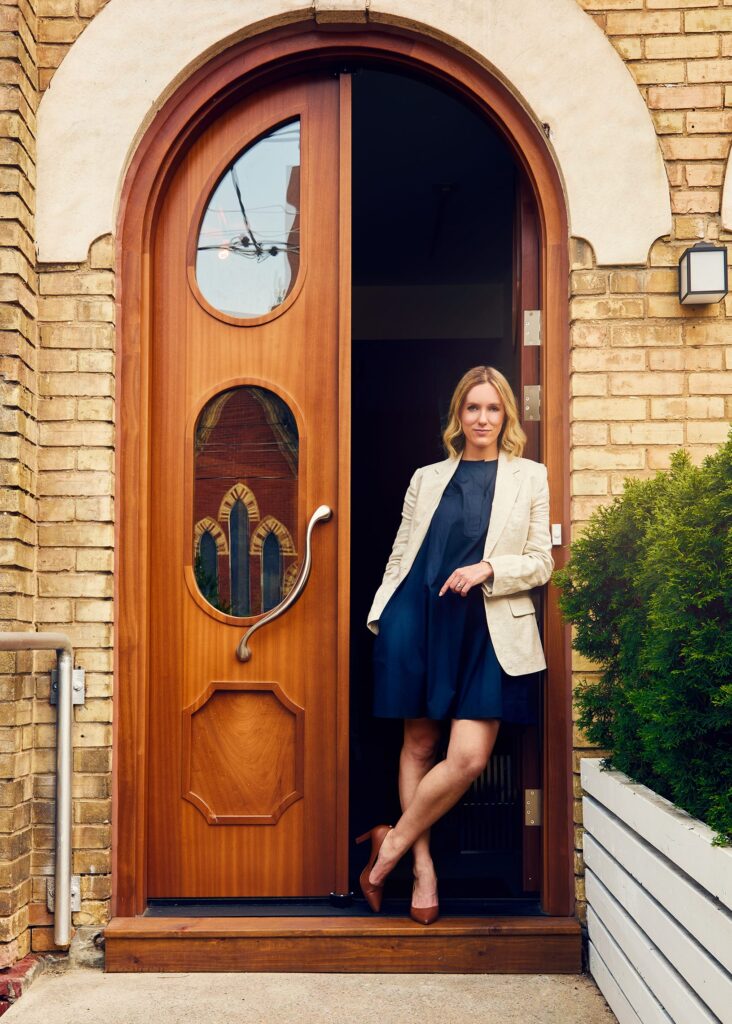Ruby Egit thinks of herself as entrepreneurial but in the lawyerly sense of the word. Call it entrepreneurial lite. She doesn’t jet-set around the world raising venture capital for new smartphone apps or dietary supplements. But she relishes a good challenge—the sense that she’s navigating uncharted waters.
In 2016, after articling at the Ontario Securities Commission in Toronto, she moved to Vancouver, where her husband, Adam Shell, had landed a job. There, Egit got hired as an associate at Branch MacMaster LLP, a local firm that specializes in class actions, insurance and health law. From day one, the senior lawyers encouraged Egit to cultivate professional relationships with clients over dinners and sports events—experiences that lawyers don’t often get until later in their careers. “I liked building my own practice, rather than just being handed file after file by senior colleagues,” says Egit.
Two years later, Egit and Shell returned to Toronto, to be closer to family. She took a position as an associate at Borden Ladner Gervais LLP. She enjoyed the work. But then, in 2020, Christopher Rhone, Egit’s former boss at Branch MacMaster, called her with a surprise offer. The firm, he said, was looking to expand. Would she care to run a new Toronto office? In short order, she agreed, relishing the chance to take on a truly unique challenge.
Egit hasn’t looked back. Although it wasn’t exactly easy to open a new office, she discovered that it might be easier than ever before. These days, there are fewer upfront costs and financial risks. Meanwhile, the potential payoffs, including the opportunity to grow the brand and expand into new markets, are just as high. In other words, the pros vastly outweigh the cons.
Lionel Tupman has arrived at the same conclusion. In 2018, Tupman, along with his friend Arieh Bloom, founded the estate and trust litigation firm Tupman & Bloom LLP in Toronto. At the time, Tupman already suspected that opportunities for work would be plentiful outside the GTA. There are pockets of wealth across the country, which means there are estates to manage (and litigate over). He also knew that the same phenomenon that drove demand for his services in Toronto played out all over the nation: Canadians are aging, which means they’ve been getting into the estate-planning (and estate litigation) game like never before. Throughout his firm’s early years, Tupman dreamed of turning it into a kind of national boutique: national, because it would operate across the country; a boutique, because it wouldn’t abandon its niche specialty as it grew.
As he and Bloom mapped out what an expansion might look like, the pair noticed that the barriers to entry were reasonably low. This wasn’t always true. As recently as a decade ago, says Tupman, opening a new office was a pricey undertaking. Once you signed a year-long lease on a property, you could be on the hook for close to six figures (depending on the size of the office). Lawyers can now work from home, or you can lease a coworking space on a month-to-month basis. Technology, too, is far simpler. Today, everyone stores data in the cloud. Laptops are cheap-ish. Add on some modest fees—to cover, for instance, the cost of additional insurance or to add users to your current software subscriptions—and you’re basically good to go. “It’s not inconceivable,” says Tupman, “that you could open an office for $10,000 in upfront expenses.” (More expenses would come in, of course, but new revenue, ideally, would come in too.)
In 2021, Tupman told Devin McMurtry, an associate at the firm, that he was looking to establish a Pacific Coast operation. Because McMurtry has extended family in British Columbia, Tupman asked if he wanted to head up an office in the province. McMurtry agreed. He now works alongside another lawyer in a coworking space in downtown Vancouver’s MNP Tower. Especially in the office’s early days, McMurtry had some business-development cushion: he could continue to work on the firm’s Ontario-based files, a helpful revenue stream as he built up a presence in Vancouver. “It wasn’t do or die,” says McMurtry. Tupman is proud to report that, through McMurtry’s hard work, the new office has been a success.
Though the arrangement with McMurtry worked out splendidly, Tupman believes that, under most circumstances, firms are better off hiring regional talent than shipping out an associate to a second location. Local lawyers know the market and the culture of the place. They can also serve as a guide for out-of-province colleagues when they fly into town to assist on cases.

In 2021, Ruby Egit launched the Toronto office of Branch MacMaster LLP, a Vancouver-headquartered law firm. At the end of last year, Egit and the Toronto team moved into a spacious rowhouse in Cabbagetown.
Last year, Tupman and Bloom had their eyes on Halifax, a regional hub that’s a short drive to other potential markets, like Moncton and Charlottetown. A mutual friend introduced him to Jonathan Hooper, an estate lawyer at a larger firm with a solid book of business and an entrepreneurial ethos. Hooper was an ideal fit. In October 2023, he started up the Halifax operation. The transition was seamless: all the firm had to do was open a trust account and file the requisite paperwork with the Nova Scotia Barristers’ Society. Hooper wrapped up his old job on a Friday and started his new one the following Monday.
Hooper was attracted to Tupman & Bloom because of its thrifty business model, passion for the practice area and tight-knit culture. (The Toronto office now has a headcount of nine lawyers.) Today, Hooper gets his share of managerial work. Though the office began in a local Regus office, Hooper soon found a permanent space near the city’s harbour. He also helped to hire a second lawyer and a paralegal for the Halifax operation. “I’m enjoying running the Atlantic Canadian part of Tupman & Bloom,” he says.
At Branch MacMaster, the partners didn’t have a long-standing ambition to expand. But after COVID-19, they found themselves deluged with class-action defence work on behalf of several clients—including insurers and long-term-care homes—based in Toronto. “I thought, Hey, Ruby’s out in Toronto,” recalls Rhone, the Vancouver-based partner. “Maybe she can help us.” He picked her because he trusted her completely: “Had it not been for Ruby, we might’ve just continued to handle our caseload from Vancouver.”
Now a partner at Branch MacMaster, Egit is thrilled with her role. She believes that she’s landed a best-of-both-worlds arrangement. She isn’t inundated with daily minutiae—“When you open an office for an existing firm,” she says, “your accounting software, tech support and insurance are all in place”—but she still gets to make leadership decisions. When her office started bringing in new work, including smaller Toronto files, she made the case to the Vancouver partners that she should hire new staff. In total, Egit has brought on four lawyers and three support personnel. (The Vancouver office is a 19-lawyer team.)
At the end of 2023, she moved the Toronto office into a renovated row house in Cabbagetown, a charming residential district. The decision seemed unorthodox—why not work in a tower downtown, like everyone else?—but the place suits her team’s needs. It’s cozy and inviting. And it’s ideal for the firm’s hybrid-work setup: there’s lots of room for everybody, but because the space is spread out over three floors, it never feels empty, which open-plan offices sometimes do on days when most of the staff is working at home.
The Vancouver partners generally defer to Egit on the Toronto side of the business. But when it came to the Cabbagetown office, they had one hesitation: the house was roughly twice as big as it needed to be. Shouldn’t she find something a bit smaller? Egit successfully pushed back, though. “We’ll be hiring more staff soon,” she told the partners. “Let’s get the office for the firm we plan to become.”
Photography by Nick Wong.


